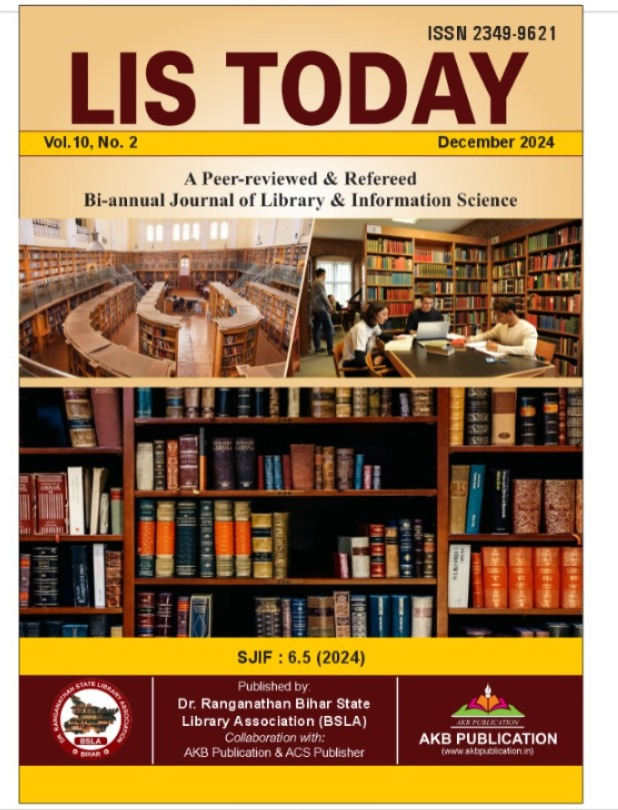Grey Literature Citations by Social Science Researchers in India: A Study
DOI:
https://doi.org/10.48165/lt.2024.10.2Keywords:
Grey literature, Citation analysis, Information utilization, Unpublished Research, Social sciences, Academic resources, AccessibilityAbstract
Grey literature has a pivotal role in the research study. It offers valuable insights that are often overlooked in traditional academic publications. Non conventional published materials such as reports, theses, and conference proceedings are examples of grey literature. This study investigates the utilization of grey literature by social science students in India, and the findings reveal that it is widely utilized due to its accessibility, relevance to local contexts, and provision of current information. The recent publication of grey literature is used more than the earlier published literature. Researchers frequently rely on government reports and NGO publications. This study encourages researchers to cite grey literature in their research.
References
Adams, J., Hillier-Brown, F. C., Moore, H. J., Lake, A. A., Araujo Soares, V., White, M., & Summerbell, C. (2016). Searching and synthesizing ‘grey literature’ and ‘grey information’ in public health: Critical reflections on three case studies. Systematic Reviews, 5(1), 164. https://doi.org/10.1186/ s13643-016-0337-y
Benzies, K. M., Premji, S., Hayden, K. A., & Serrett, K. (2006). State‐of‐the‐evidence reviews: Advantages and challenges of including grey literature. Worldviews on Evidence Based Nursing, 3(2), 55–61. https://doi.org/10.1111/j.1741- 6787.2006.00051.x
Conn, V. S., Valentine, J. C., Cooper, H. M., & Rantz, M. J. (2003). Grey literature in meta-analyses. Nursing Research, 52(4), 256–261. https://doi.org/10.1097/00006199-200307000- 00008
Debachere, M. C. (1995). Problems in obtaining grey lit erature. IFLA Journal, 21(2), 94–98. https://doi. org/10.1177/034003529502100205
Denda, K. (2002). Fugitive literature in the crosshairs: An exam ination of bibliographic control and access. Collection Management, 27(2), 75–86. https://doi.org/10.1300/ J105v27n02_07
Gelfand, J. (1998). Teaching and exposing grey literature: What the information profession needs to know—Examples from the sciences. Collection Building, 17(4), 159–166. https:// doi.org/10.1108/01604959810238301
Hoffecker, L. (2020). Grey literature searching for system atic reviews in the health sciences. The Serials Librarian, 79(3–4), 252–260. https://doi.org/10.1080/0361526X.2020. 1847745
McKimmie, T., & Szurmak, J. (2002). Beyond grey literature: How grey questions can drive research. Journal of Agricultural & Food Information, 4(2), 71–79. https://doi.org/10.1300/ J108v04n02_06
Mandal, P. S., & Mandal, S. (2021). Grey literature citation in doctoral theses of library and information science awarded by the University of Burdwan from 2010 to 2019. Library Philosophy and Practice (e-Journal). Retrieved from https://digitalcommons.unl.edu/libphilprac/4894
Mandal, P. (2020). Text citations and bibliographic analysis of doctoral theses in library and information science awarded by the University of Burdwan from 2010 to 2019. Library Philosophy and Practice (e-Journal). Retrieved from https://digitalcommons.unl.edu/libphilprac/4551
Pappas, C., & Williams, I. (2011). Grey literature: Its emerging importance. Journal of Hospital Librarianship, 11(3), 228– 234. https://doi.org/10.1080/15323269.2011.587100
Paez, A. (2017). Grey literature: An important resource in sys tematic reviews. Journal of Evidence-Based Medicine, 10(3), 233–240. https://doi.org/10.1111/jebm.12266
Yasin, A., Fatima, R., Wen, L., Afzal, W., Azhar, M., & Torkar, R. (2020). Using grey literature and Google Scholar in systematic literature reviews in software engineering. IEEE Access, 8, 36226–36243. https://doi.org/10.1109/
ACCESS.2020.2971712

